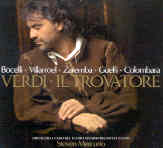Since it’s almost unnecessary to discuss the achievements of anyone involved with this undertaking except for Andrea Bocelli, I will dispatch the rest of the cast quickly: Carlo Guelfi is a fine Count di Luna, good as measured against any other on CD; Elena Zaremba’s Azucena is well sung and articulated but comes nowhere near the hallucinatory depths of this, the opera’s most interesting character; Carlo Colombara sings Ferrando’s music with energy and round tone, but little inventive spookiness. Summarizing Veronica Villaroel is not quite so easy. At times her voice is quite beautiful, at times it sounds weirdly produced and bottled up. Her diction is poor. She has no trill. She goes from sounding somewhat involved in the text to being dangerously close to falling into a coma from indifference. Her coloratura and high notes are spot-on. She can be alluring but is mostly dull; you get more pleasure out of trying to figure out what is wrong with her than in actually listening to her.
This is Bocelli’s third complete opera recording, in a role that certainly would be further from his natural vocal abilities on stage than the other two–Rodolfo or Cavaradossi. But through the magic of recording, he is more than audible even in large ensembles and when up against the entire Verdian orchestra. Just for the record, all of the singers are very closely miked and the recording level is incredibly high: if you’re careful, you can hear Villaroel’s lungs filling up with air. But the good news is that Bocelli, clearly under the tutelage of the late, lamented Franco Corelli, has found a way to darken the tone of the bottom third of his range, and to very good effect. There is a richness to the sound that is handsome and virile and very un-pop-singer-like. Furthermore, he pays far closer attention to the meaning of what he’s singing than in his other operatic undertakings and comes closer than ever before to heeding the score’s dynamic markings.
And the beauty of the voice is undeniable. He still occasionally sounds as if he just wants to get the notes out (the relentlessly high tessitura in the finale to Act 2 strains him somewhat), but the very top notes are splendid. The high-C with which he caps “Di quella pira” will delight his fans–and many others, I suspect. At any rate, Bocelli certainly won’t be any true opera aficionado’s favorite Manrico, but it is a creditable performance.
Steve Mercurio’s leadership is unimaginative but lively, as the event calls for, but he conducts the score note-complete and it’s well played and sung by the Catania musicians. As mentioned, the sound is incredibly in-your-face, but clear. You’ll know if you want this.
































